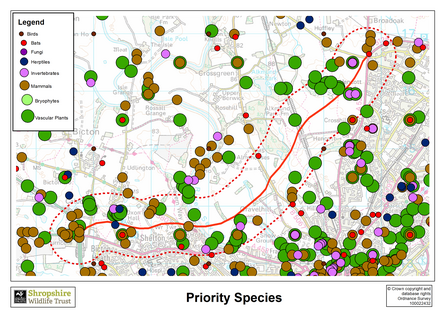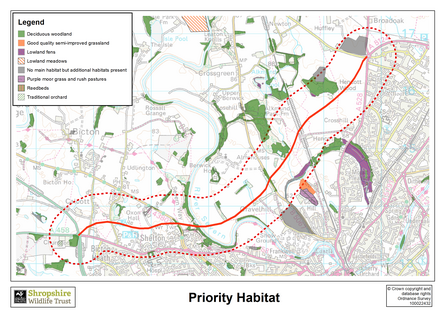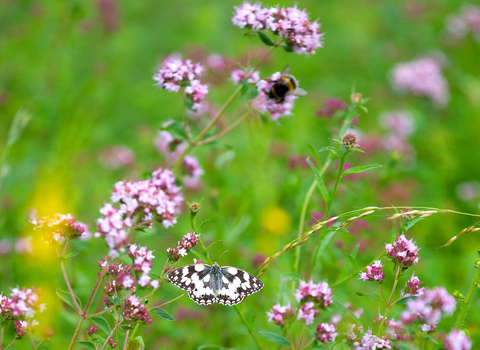All of this will be lost forever
UPDATE: We are very disappointed that Shropshire Council’s planning committee has decided – by the narrowest of margins - to go ahead with the North West Relief Road (NWRR) scheme despite the serious objections raised. It will do immense damage to wildlife along the route of the road, and will cut off Shrewsbury’s last remaining green corridor along the Severn.
"We cannot see how the carbon emissions from construction alone can be squared with the Council’s own declaration of a climate emergency." says Shropshire Wildlife Trust CEO, Richard Grindle.
"It is far from clear that the road will reduce congestion in the long run; and whilst some communities may see reduced traffic, others will be negatively affected. The business case was based on traffic modelling from before covid, and on estimated costs which have already more than doubled; but it was not reviewed before this decision was taken. It would appear that Shropshire Council can only afford to go ahead because the current government has provided new funds from the cancellation of HS2. These funds would arguably be better spent on improving public transport across Shropshire."
"If the NWRR does go ahead, Shropshire Council must ensure that the concerns about potential contamination to Shrewsbury’s drinking water are addressed, and that biodiversity and carbon impacts are mitigated in full."
If you're looking for a way to respond to the approval of this road, you can sign the petition to Save the Darwin Oak, or donate to the fundraiser for a legal challenge of the decision.
About the scheme
Shropshire Council's proposed North West Relief Road would link Churncote roundabout to Battlefield roundabout. The aim to reduce the journey time of drivers, as well as reducing congestion within Shrewsbury, reducing carbon emissions and improving air quality. We disagree and believe the scheme will have a terrible impact on the local landscape.
For years Shropshire Wildlife Trust and other community groups have fought the road, because it will:
- Adversely impact habitats and species all along the route
- Pass within 80m of Hencott Pool SSSI, 4 Local Wildlife Sites including Shelton Rough: already threatened with development
- Add to growing atmospheric pollution and CO2 emissions
- Destroy the quality and tranquillity of the landscape, particularly in the Severn floodplain
- Enclose the town in a ring of development, decreasing access for pedestrians and cyclists.
What is more, no matter where you live in Shropshire, the scheme could affect you. It will use money from the county-wide infrastructure budget, which was already stretched before Covid.
The market towns are, understandably, less than happy that if the road goes ahead, Shrewsbury will get tens of millions of pounds at the expense of
Better Shrewsbury Transport (BeST) have produced a FAQ leaflet that outlines more info about the road, you can download it here:
Environmental impacts
The construction of the NWRR will have an undoubted impact on Shrewsbury’s climate, wildlife, habitats and landscapes.
Shropshire Wildlife Trust has compiled a database of all the species of plants, animals and birds within 500m of the proposed route and identified key sites that may be affected by the road construction.
Within the proposed site, over 860 animal species and 100 bird species have been recorded, this includes:
- Hedgehogs
- Great crested newts
- Water voles
- White-letter hairstreak
- Common pipistrelle
- Toads
- Cuckoos
- Barn owls
- Kingfishers
- Hen harrier

Many habitats within the 500m of the proposed route will also be affected including:
Shelton Rough Local Wildlife Site (LWS) – although associated development proposal actually impinge on the LWS
The River Severn (LWS)
Old River Bed Shrewsbury (LWS)
Oxon Pool (LWS)

The construction, and later use of this road, will have a negative impact on the local wildlife. Government figures and independent reports suggest there will be an increase in traffic and emissions because of this relief road and therefore, an increase in the climate threat to biodiversity.
Shropshire’s Local Transport Plan suggests that 30% of Shropshire’s total carbon emissions come from transport
We need to say NO to the outdated belief that building more roads is the answer to all problems.
What can you do?
If you're looking for a way to respond to the approval of this road, you can sign the petition to Save the Darwin Oak, or donate to the fundraiser for a legal challenge of the decision.

